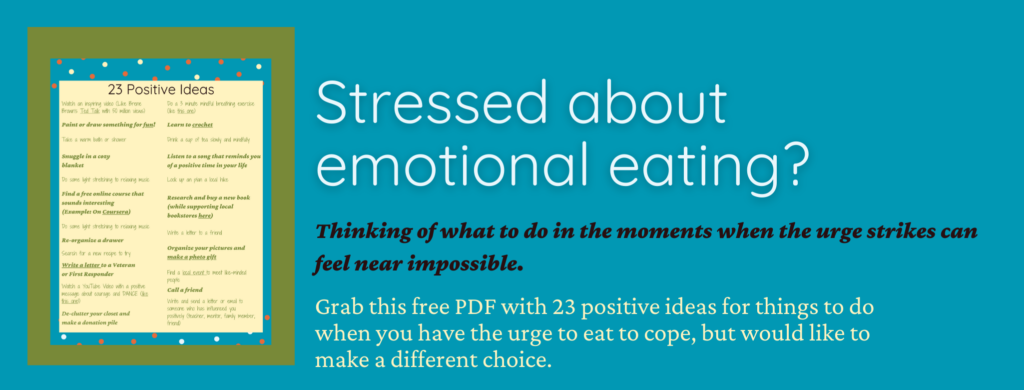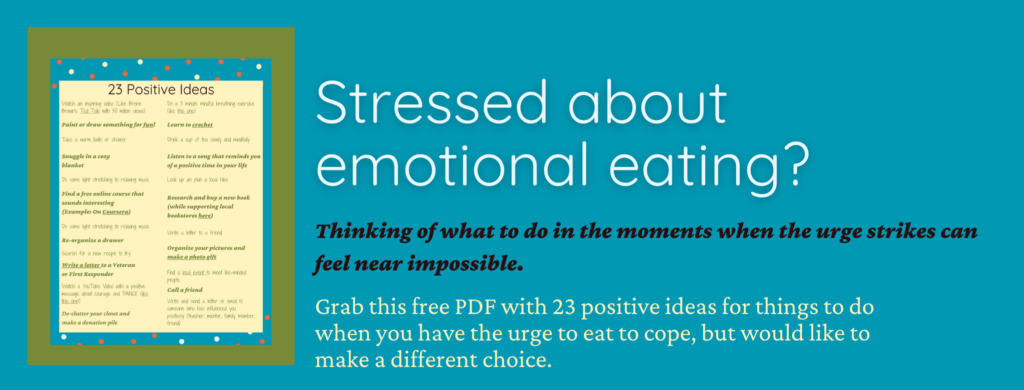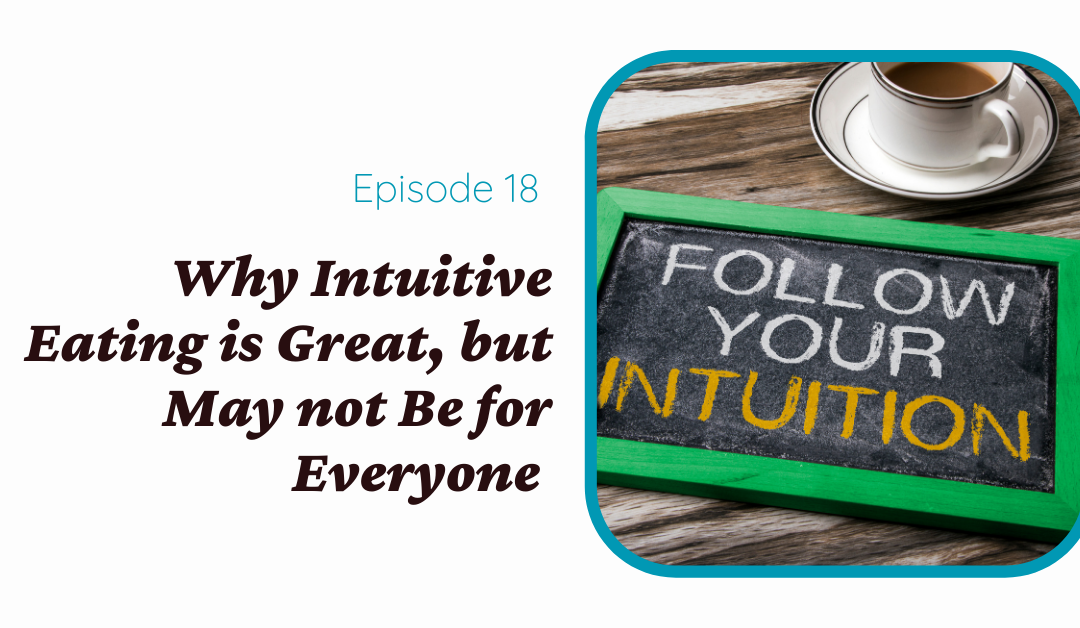Podcast: Play in new window | Download
Subscribe to The Innovative Therapist Podcast! Apple Podcasts | Spotify | RSS | More
Episode 18. Have you heard of Intuitive Eating? I gave an overview in my first post and episode in this series.
But first, did you grab my free guide yet? In the moments when you have a strong desire to eat to cope with emotions, it can feel almost impossible to do something else. I created this guide for those moments. It lists several different options for things to do instead of eating. It’s all about choice, increasing confidence, and therefore feelings of empowerment. Grab it for free here for quick and simple options right at your fingertips (with links, most 100% free) for those difficult moments.

Intuitive Eating Review
Intuitive eaters do not restrict themselves for the purpose of weight loss. They honor their hunger and fullness signals and they are most certainly not on a diet.
Sounds nice, right? Or maybe for some, initial thoughts may be that it sounds impossible, irresponsible, or even scary.
Research suggests that Intuitive Eating is helpful for many people. This is particularly true if you have struggled with chronic dieting, weight cycling, and/or an eating disorder. This approach can be incredibly empowering after a lifetime of tracking everything that goes in your mouth, or feeling guilty when you are not.
That said, we are all individual and unique. For that reason alone, the Intuitive Eating approach may not right for everyone. In this post and episode we will cover:
- Some objections or concerns people have about Intuitive Eating
- Some reasons Intuitive Eating might not be more widely promoted, including objections from the medical community
- 7 ways you can utilize wisdom from Intuitive Eating regardless of the approach you take
Questions and Concerns about Intuitive Eating
Some of the questions and concerns I often hear about Intuitive Eating include:
- Can everyone get to a place of true intuitive eating in our food environment? Or could this paradigm set some people in some environments up for significant weight gain, since hyperpalatable foods are so readily available?
- How do eating preferences play into this? If you hate vegetables, will this approach really allow you to reclaim an eating pattern that optimizes your health?
- Are there other times when an Intuitive Eating approach wouldn’t be the best option, like times when someone is incredibly stressed, for example?
- What populations has Intuitive Eating been studied in?
Today we will dive into some of these questions, but I’ll warn you right now I don’t have all the answers. I, like you, am growing learning and changing all of the time. The important thing to consider as you listen or read is that you get to decide which approach makes you feel empowered and feels useful to you right now. You can get guidance, but you are the deciding factor. You know what’s best for you.
Individual Objections to Intuitive Eating
I often discuss Intuitive Eating with people I work with 1-on-1 or in groups. There are a number of concerns and objections that come up, including:
“I need to start losing weight now.”
The Intuitive Eating approach is very clear: quick weight loss is not the goal.
I will talk in my next post (Part 3 of 3) about the fact that over the long-term (over years, not weeks), an Intuitive Eating approach can lead to weight loss at least for some. Additionally, I have heard of and worked with folks who describe feeling autonomous in their motivation and experiencing some weight loss, who are arguably doing several of the principles with Intuitive Eating. The tricky thing is, as Intuitive Eating talks about, if you are doing it just hoping that it will lead to weight loss, it can and does very often undermine the process of returning to Intuitive Eating.
Bottom line: Most of the research would suggest that if quick weight loss is your most important goal, the Intuitive Eating approach is probably not the best option. The good news is, Intuitive Eating will always be around and can be considered down the road. Again, you get to choose.
“I need more structure.”
Intuitive Eating by design is relatively unstructured. At times, for people who have been dieting their whole life, this can be exciting. For others, it can be quite scary.

Depending on the person, there are some rules or limits that can feel helpful, not restrictive. For example, some people find it simpler to stay away from sweets, or like the accountability and awareness that comes with keeping a journal (maybe tracking hunger and habits versus nutrition information, for example). If it provides a sense of confidence and usefulness, versus deprivation, then there is nothing inherently bad about that.
Others with eating patterns that are so irregular and all over the place, may also struggle with the idea of “unconditional permission to eat”. Establishing a plan for the day or the week, perhaps including portion sizes, can provide a sense of structure that can help people get back on a path towards a healthy relationship with food.
Having a plan for your eating or putting boundaries around it is not necessarily incompatible with Intuitive Eating, but some people want more structure than the Intuitive Eating approach or just reading the book can provide, and that is perfectly okay.
“I am too scared to give myself unconditional permission to eat. I will just eat a ton of junk.”
Lack of trust in your body and its signals is often a product of following a lifetime of rules about what one “should” eat. This lack of trust may also be related to a history of eating the food that makes up the standard American diet (lots of processed foods with excess fat, sugar and salt added).
This belief (i.e., “I cannot control myself without a diet plan”) can gradually be un-learned with an Intuitive Eating approach, but it takes time and patience. However, as I will discuss below, there is some concern about using an Intuitive Eating approach if you are constantly surrounded by tempting foods and have limited access to healthy foods. As discussed below, I think we frankly need to study and understand this more thoroughly to really know how this approach works in a wide variety of people.
If this is the case, it does not mean that Intuitive Eating won’t be useful to you, but some other changes to your environment might also be helpful for long-term success.
Some Objections to Intuitive Eating

Intuitive Eating has been around since the book was written in 1995, yet you are not very likely to hear about this approach at your doctor’s office.
Common Concerns or Objections Have Included:
1. Intuitive Eating does not typically produce fast, visible results.
The Western medical model is typically focused on immediate measurable outcomes. They are much more impressed if you can show a 20 lb weight loss, versus an increased score on a questionnaire that says you feel more at peace with food.
This is not to discount the health benefits that can occur down the road, but again, our medical community typically loves quick results, not months or years in the future.
2. The objection that not focusing on weight loss may not be in the best interest of all.
This one is incredibly controversial.
Although most researchers agree that there is benefit to reducing weight stigma and widening our idea of what a healthy body can look like, concerns have been raised that abandoning weight loss efforts may be harmful for some (Penny & Kirk, 2015; Sainsbury & Hay, 2014).
Concerns include the benefits of modest weight losses (e.g., 5-10% of initial weight) that are maintained, that could be missed if weight loss is no longer a goal. Additionally, skeptics have noted that many of the studies conducted about Intuitive Eating have had limited sample sizes, and are primarily done with women with disordered eating, and/or individuals in the overweight or Class I obesity range (BMI 30-35 kg/m2). Therefore, results may or may not apply to individuals of higher weights or more diverse groups (Penny & Kirk, 2015).
Other concerns include the fact that our weight “set point” (the weight our body naturally tries to maintain) can gradually go up, and may become harder to lower the longer we maintain a higher weight (Sainsbury & Hay, 2014). That is, if we ignore significant amounts of weight gain, we may be making it much harder for our bodies to achieve optimal health in the future.
3. There are too many things in our environment besides hunger than encourage us to eat. Therefore, Intuitive Eating could potentially set us up for weight gain.
Based on the existing research, this does not seem to be the case. In that the non-diet interventions tended to result in weight maintenance and improve health outcomes (Bacon, Stern, Van Loan, Keim, 2005). But as mentioned above, sample sizes have been limited and so we cannot rule this out. Additionally, I have heard anecdotal stories of this occurring, but not in people I’ve worked with directly (most people I work with who take an Intuitive Eating approach tend to on average maintain a similar weight, give or take a handful of pounds).
There are obviously many other things that make us eat even when we aren’t hungry.
Food companies know what they are doing when they design our foods. They certainly aren’t adding the perfect combination of fat, salt, and sugar by accident.
Changing our food environment is not necessarily incompatible with an Intuitive Eating approach, but the idea that our bodies can regulate our food intake naturally in any food environment is certainly something that should be questioned and has not been thoroughly studied.
Even if we work to be aware of our hunger and fullness, many of us will want to take additional steps to improve our food environments, like removing or limiting tempting foods in the home. This isn’t inconsistent with an Intuitive Eating model per se, but not something suggested in an outright manner. Likely, because doing so could come across as a “you should do this” and could undermine the process, in theory.
4. Someone with a strong preference for highly processed, hyperpalatable foods might be set up to fail.
We know that our eating history, as early as in utero and during breastfeeding, have an impact on the foods we prefer throughout our lives (Ventura & Woroby, 2013). Additionally, repeated exposure to healthful foods without pressure can increase liking for that food, while parental pressure to eat (e.g., clean your plate before you can go play, or finish your vegetables otherwise you don’t get dessert), can decrease liking of certain foods (Ventura & Woroby, 2013).
Additionally, there is research that individuals with higher weights may have a harder time with interpreting internal signals of hunger and fullness (Herbert et al., 2013). We need more research to uncover the impact of the diet mentality, weight bias and stigma on this. For now, without additional support/training in this area, further study is needed to determine whether certain individuals may struggle with an Intuitive Eating approach.
5. It hasn’t been studied in enough diverse groups.
It’s hopefully no surprise at this point that research is biased. We often use convenience samples, and therefore as mentioned above much of the research on Intuitive Eating has been conducted among college students, often of relatively smaller body sizes. Therefore, we want to generalize to other samples with caution, as always (Penny & Kirk, 2015).
7 Ways to Use the Wisdom of Intuitive Eating Regardless of the Approach You Take
Regardless of what you focus on to improve your health, the Intuitive Eating approach clearly has benefits. Below are recommendations for applying the wisdom of Intuitive Eating that would benefit all of us.
- Focusing on how lifestyle choices (eating habits, exercise) make you feel. Relying solely on some expert opinion about the “right diet” for your body just does not make sense anymore. We are too different to have one eating plan work for all. This is going to be a trial and error process, but if we view it as a learning experience with less self-judgment, it does not have to be so burdensome and can actually be enjoyable. Instead of asking yourself how to be “good” and lose weight today, ask yourself “How can I make choices today that will help me feel as good as possible in my body throughout the day?”
- Focus less (probably much less) on the number on the scale. You can still weigh yourself occasionally if you want (of course defer to a health professional on this recommendation if you have any psychological or medical diagnoses that are relevant), but it truly is only one piece of information about your health and may have very little to do with how you feel physically. Over-focus on the number can distract from figuring out an eating pattern that fits you.
- Ditch the mindset that eating habits reflect our character. Yes, there are foods that absolutely harm our health and are pretty much useless in terms of nutrition, but eating these foods does not make us terrible people. We judge ourselves and others really harshly at times for their lifestyle choices, and it needs to stop, because it just isn’t helpful.
- Consider trying Intuitive Eating for a period of time as an experiment. If you have tried a ton of different diet programs, only to feel hungry, deprived and then binge eat on “forbidden foods,” perhaps trying an Intuitive Eating non-restrictive approach for a period of time would be useful. With any new approach to our eating, it helps to come into it with an open mind and and attitude of curiosity. Additionally, a support system around this new and different approach is very useful. I have the Body Respect Program that opens a few times a year, you can get on the waitlist here.
- The environment will still matter for most of us. Maybe there is a small portion of the population who really isn’t all that tempted by having foods they enjoy readily available in their home. But if you are like most of us, having those foods around and frequently visible (e.g., on the counter) will almost always making you have more than you would have. Regardless of the approach you choose, examining the foods in the home and work environment can be incredibly useful.
- Mindful eating will still be helpful. In fact, I would argue that some form of focus on internal signals (hunger, fullness) is essential, unless you plan to record your eating for the rest of your life (and who wants to do that? No one I have met). Our bodies have different calorie and nutrient needs from day to day so we need to learn to listen and have some degree of flexibility. Slowing down your pace of eating, eating with minimal distractions (at the table, without TV or your phone next to you) will always be helpful. Ask yourself, “am I truly hungry?” before eating, and check in with yourself part way through the meal.
- Remind yourself that you are the expert on your body and what eating pattern will work for you. Diet mentality and our culture’s fixation with weight loss has left us not trusting ourselves to make our own food choices. Whatever approach you choose, it will probably require some tweaking and adjusting, because our relationships with food are complex. It’s great to get advice from experts, especially when they are credible, but ultimately you are in the driver’s seat to figure out the plan that will work best for you. Autonomy is key, in my humble opinion.
See you next time!
In next week’s post and episode, I will cover the most frequently asked questions about Intuitive Eating and how this all makes sense! I will discuss my personal experience with it, as well as different experiences of people I’ve known and worked with.
Did you grab your freebie yet?
To increase feelings of competence that we can handle our emotions without food, we often need options. Grab my free PDF guide with 23 positive ideas for things to do in those moments when you are wanting to grab a snack but you really would feel best if you did something else.

Disclaimer: This blog and podcast is for informational and educational purposes only. It is not a substitute for individual professional advice or treatment, including medical or mental health advice. It does not constitute a provider patient relationship.
References
Herbert, B. M., Blechert, J., Hautzingerd, Mathias, E., Herbert, C. (2013). Intuitive eating is associated with interoceptive sensitivity. Effects on body mass index. Appetite, 70, 22–30.
Matheson, E. M., King, D. E., Everett, C. J. (2012). Healthy lifestyle habits and mortality in overweight and obese individuals. Journal of the American Board of Family Medicine, 25, 9 –15.
Penny, T. & Kirk, S. (2015). The Health at Every Size Paradigm and obesity: Missing empirical evidence may help push the reframing obesity debate forward. American Journal of Public Health, 105, e38–e42.
Sainsbury, A. & Hay, P. (2014). Call for an urgent rethink of the ‘health at every size’ concept. Journal of Eating Disorders, 2.
Ventura, A. & Woroby, J. (2013) Early influences on the development of food review preferences. Current Biology, 23, 401-408.

Trackbacks/Pingbacks